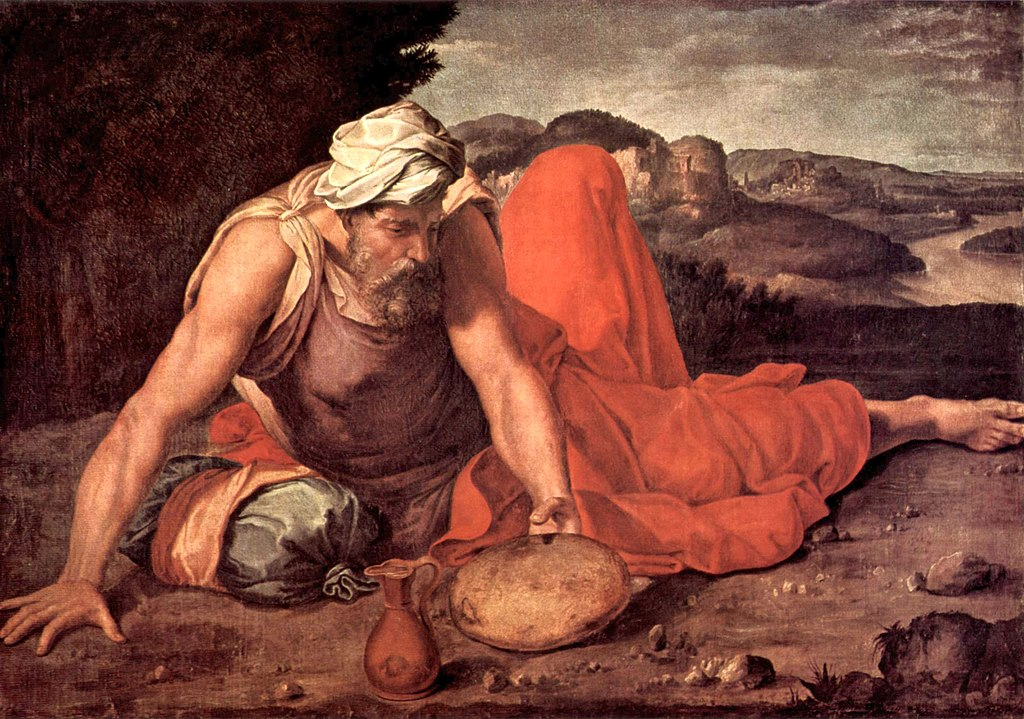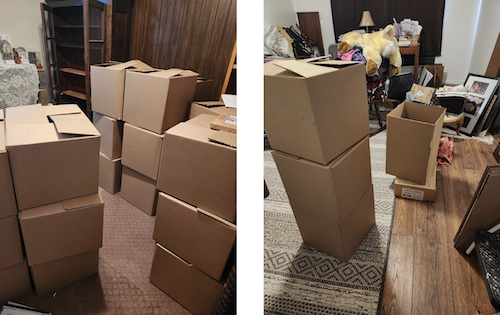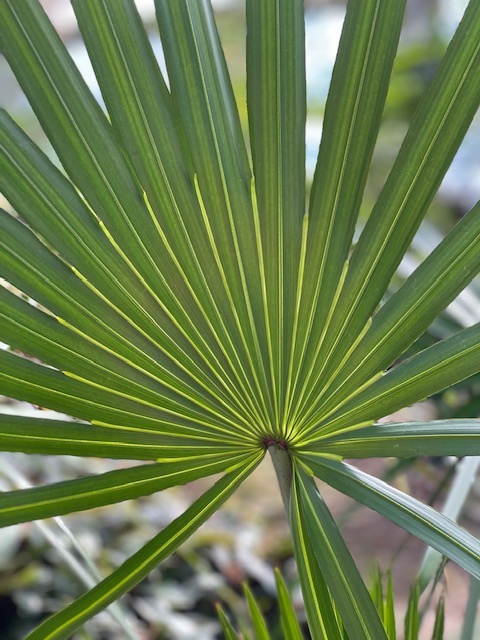 In this third episode of The Liturgical Rebels Christine Sine interviews Scott Erickson, a creative artist and storyteller, who shares his journey as an artist and how he uses his God-given creativity to bring the biblical story to life in fresh and new ways. They discuss his early artistic influences, his experience using art in church services, and his approach to developing a visual vocabulary. Scott and Christine also explore his decision to move away from traditional Christian symbols and his focus on creating artwork that invites viewers to unknow the familiar story. Scott emphasizes the importance of experiencing awe and wonder and the role of art in connecting with the giver of our souls.
In this third episode of The Liturgical Rebels Christine Sine interviews Scott Erickson, a creative artist and storyteller, who shares his journey as an artist and how he uses his God-given creativity to bring the biblical story to life in fresh and new ways. They discuss his early artistic influences, his experience using art in church services, and his approach to developing a visual vocabulary. Scott and Christine also explore his decision to move away from traditional Christian symbols and his focus on creating artwork that invites viewers to unknow the familiar story. Scott emphasizes the importance of experiencing awe and wonder and the role of art in connecting with the giver of our souls.

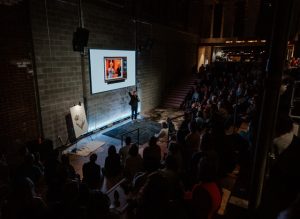
Throughout the conversation, Scott reflects on the responses he receives to his artwork and the impact of art on the margins of society. In this conversation, Christine Sine and Scott also discuss the importance of mindfulness in daily life. They explore how mindfulness can improve emotional well-being, physical health, relationships, and productivity. The conversation emphasizes the benefits of being present in the moment and cultivating a mindful mindset.
Takeaways
- Art can be a powerful tool for bringing the biblical story to life in fresh and new ways.
- Developing a visual vocabulary and exploring symbols beyond traditional Christian imagery can help deepen our understanding of the story.
- Experiencing awe and wonder is essential for connecting with the deeper meaning of the story and the presence of God.
- Art created from the margins can have a profound impact on individuals and communities, offering a different perspective and inviting deeper reflection. Mindfulness is a powerful practice that can improve various aspects of life.
- Practicing mindfulness in daily life can lead to greater emotional well-being.
- Mindfulness can have positive effects on physical health, including reducing stress and improving sleep.
- Being mindful in relationships can enhance communication and connection.
- Incorporating mindfulness into work and daily tasks can increase productivity and focus.
Stay Connected
For more information about Scott Erickson his artwork and books, please visit him at scottericksonart.com, follow @scottthepainter on instagram or join him on substack https://scotterickson.
from Christine Sine
This week has been a mixture of delight and frustration. Delight because the daffodils in my back garden are now in full bloom and as I walk down the street on my awe and wonder walks, the beauty of flowering trees is a feast for my eyes.
Unfortunately, we continue to face challenges with the Godspacelight website. It is partly because of changes made necessary by new regulations regarding security, so that when we upgraded our theme recently, all kinds of links broke. Melissa spent hours last week fixing over 100 broken links, and that only scratches the surface. I must confess, it makes me feel as though I have wandered into a different kind of wilderness this Lent. As well as that, because we have posted almost daily since 2008, godspacelight has become huge. So we are working on some changes that will reduce the size – like deleting some of the oldest posts (probably years 2008 – 2013) and moving the store to Etsy, without adding to my expenses. Thank you for bearing with us as we scramble to make the necessary changes and for patiently walking this journey with us. In the midst of these changes I am very grateful that I am not alone. Without help from my assistant Melissa, and our technical support person Julie Bonn Blank we would be permanently broken and closed down.
“I am not alone” is in many ways my theme for this week, reflected in my Meditation Monday: Community in the Wilderness, in which I reflect on Jesus’ companions in the desert – animals and angels, and the reassurance I receive from the suggestion that God never wants us to be alone and often surrounds us with unexpected companions.
Interestingly, as I interview creative artists, poets and worship curators for my podcast The Liturgical Rebels, many comment that they feel lonely and marginalized. They see the podcast as a way to connect lonely and marginalized people who feel isolated in their creativity and imaginative approaches to spiritual practices. Don’t forget you can access the podcast episodes through buzzsprout, as well as through your usual podcast server, so check out the first 2 episodes before our third episode, an interview with creative artist and storyteller Scott Erickson goes live tomorrow. I am still reflecting on Drew Jackson’s invitation into the mystery of it all and his challenge to see poetry is a doorway to that. I think that art, music, nature, and curated worship also provide doorways through which we can enter that mystery. Over the coming months we will explore different aspects of all of these.
In Freerange Friday: Let God Take You Into The Wilderness, Lilly Lewin furthers her reflections on the wilderness in which Jesus experienced his temptations. Her questions: How have you noticed the Wilderness this week? Has it been in a positive or a negative way? And How have you experienced God’s presence? Had me pondering my own wilderness experiences and how I feel God has met me in the midst of them. It is a fantastic read.
I loved Laurie Klein’s Book Day… With Jesus, which she wrote for World Book Day. She begins by talking about The Book of Kells, a beautiful illuminated gospel that now resides in Trinity College in Dublin. Her comment “A book makes time travellers of us,” as a prelude to imagining ourselves with Jesus as he writes in the dust is inspiring.
On Wednesday in God – You Have Got to Be Joking June Friesen introduced us to the foolishness of her current situation as she and her husband prepare to move yet again. She uses it to reflect on the Hebrews crossing the Jordan into the promised land, across a river in flood, another one of those foolish things God does. It makes me very grateful for GPS systems which tend to avoid flooded rivers.
On Tuesday I posted early for International Womens Day, which was on Friday. My title Standing With Mary Magdalene and All the Women of the World says it all. “Mary Magdalene is one of the most misused and abused women in the Bible, a fitting symbol for women throughout the ages who are still misused, abused and blamed.” You might also like to check out this Franciscan Prayer for International Womens Day, which I highlight on social media each year. I love to read through it each year, appropriate not just for International Women’s Day but also for Mothering Sunday, celebrated in the UK last Sunday.
Don’t forget it is also time to sign up for the upcoming Spirituality of Gardening seminar. This is not just for gardeners, but for everyone who loves to wander in God’s created world and notice the beauty and creativity of God it displays.
My prayer for this week is one I wrote last year, but am enjoying again as I wander my neighbourhood.
Grasp the beauty of today.
Slow down and linger,
As long as possible in its presence.
It will quickly fade away,
This never to be repeated,
Special moment of intimacy,
With our Creator.
Sit in the sacred circle of life,
With all the creatures of this earth.
Godʼs is the day,
Godʼs also the night.
Pause and savor the wonder of this space,
Between the ending,
And a new beginning.
(C) Christine Sine godspacelight.com
Many blessings on you this week. We appreciate your prayers.
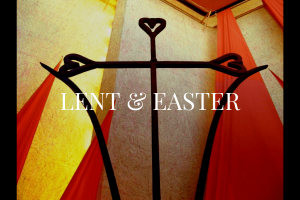 Take some time to explore Godspace Light’s Lent and Easter resources. You can find liturgies, activities, prayers and past posts to enrich and enliven your Lent and Easter season.
Take some time to explore Godspace Light’s Lent and Easter resources. You can find liturgies, activities, prayers and past posts to enrich and enliven your Lent and Easter season.
by Christine Sine
Thank you for being a God who does not wish for us to be alone. We hold close that you are a God who didn’t just feed the five thousand but gave them people to eat with (Cole Arthur Riley Black Liturgies 69)
I love Cole Arthur Riley’s unfamiliar take on this gospel passage, which really caught my attention this week. “God who does not wish us to be alone” made me think about Jesus’s sojourn in the desert, one of those times in his life when he seemed so much alone, and yet he was not alone. God provided him with animals as companions and angels to serve him. (Mark 1:13) Yet we rarely mention them.
Interestingly when I looked at images of Jesus in the desert they rarely showed the wild animals, or the angels. It made me aware of how easily we dismiss the importance of non-human companionship. Animals matter in our lives, especially in times of testing. There is nothing quite like the joy of coming home to a pet waiting by the door to greet us. Interacting with animals has been shown to decrease stress and lower blood pressure. Other studies have found that animals can reduce loneliness, increase feelings of social support, and boost your mood. The pandemic, when so many acquired animals to help see them through their loneliness reinforced that.
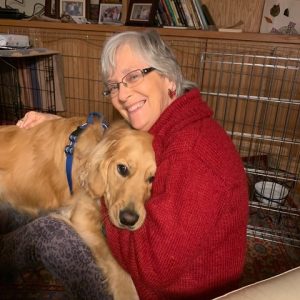
What about the angels though? In her fascinating book Love of Thousands, Christine Valters Paintner guides us to see the ways all of us are supported by angels. She believes each of us has our own guardian angel who protects the human soul from inner and outer troubles, helps redirect the soul that has gone astray, and supports us in our prayer and connection to God. Evidently, by the time Jesus arrived in the world, angels had been an integral part of Jewish belief for a long time. They are often seen as a link between earth and heaven. The early church theologians too would counsel us to call on our guardian angel to help us through challenging moments and so it was not hard for the people of Jesus time to believe that the angels looked after him in the desert, just as they do for any of us walking through desert places.
Today, as I imagine Jesus sitting in the wilderness, struggling with Satanic attack, he is not alone. He is at the centre of a large community. He is surrounded by lions and deer and birds, and even jackals, drawn close to comfort and support him. I see him reach out to caress the soft fur of a lion cub that crawls up onto his lap. A lamb sits at his feet. Here in the desert, in the place of testing we catch a glimpse of God’s coming eternal kingdom where all creation is in accord once more, lying down together with the One who is the caretaker of the new creation. Hope and promise in the midst of community and in the place of testing. We have all experienced it. The angels are there too, strengthening Jesus’ resolve, nourishing him in body and spirit and protecting him from the Evil One.
One thing that Christine Valters Paintner encourages us to do is to connect to our guardian angels, to take time to sit and ask the Sacred Source of All to open our eyes to see our own guardian angels. It is a profound mystical experience. To sense that angelic presence that hovers over each of us at all times is quite amazing.
Next time you find yourself in a desert place, sit and visualize yourself with Jesus in the wilderness, surrounded by the comforting presence of animals and being upheld by the nourishing ministrations of angels. Reach out to your pet, if you have one. Allow the warmth of its presence to draw you into the love of God. Perhaps you would also like to sit quietly and ask your guardian angel to reveal itself. I know this is something many of us are not comfortable with, but for others it is like the greeting of an old friend. Sit with your eyes closed and imagine this protective presence surrounding you. Consider ways that you could continue to attune yourself to this presence as a protector, spirit strengthener and guide.
NOTE: As an Amazon Associate I receive a small amount for purchases made through the appropriate links above.
If you’ve been following along with me this Lent, you know that I’m pondering the Wilderness….considering both the good things about the wilderness like the beauty of Nature and the opportunity to hear from God, and also the harshness of the wilderness and the need to be prepared. It was such a gift to get to be at Lake Michigan and walk through the forest and on the beach each day! The beauty of the Wilderness refilled my cup. It has been hard to walk the dog in my urban neighborhood with it’s trash and traffic noise. I’m being challenged and invited by Jesus to find him in the wilderness of the city too.
How have you noticed the Wilderness this week? Has it been in a positive or a negative way?
How have you experienced God’s presence? Take a few moments to thank God for this.
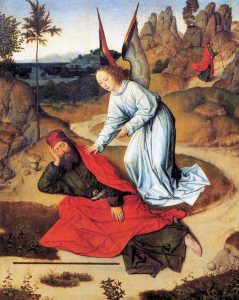
Dieric Bouts Prophet Elijah in the Desert
Today we are reading and considering Elijah the prophet. He experienced the wilderness, actually he escaped to the wilderness after defeating the prophets of Baal and angering Queen Jezebel
1 Kings 19:1-18 The Message You can read this passage in other versions here.
Ahab reported to Jezebel everything that Elijah had done, including the massacre of the prophets. Jezebel immediately sent a messenger to Elijah with her threat: “The gods will get you for this and I’ll get even with you! By this time tomorrow you’ll be as dead as any one of those prophets.”
3-5 When Elijah saw how things were, he ran for dear life to Beersheba, far in the south of Judah. He left his young servant there and then went on into the desert another day’s journey. He came to a lone broom bush and collapsed in its shade, wanting in the worst way to be done with it all—to just die: “Enough of this, God! Take my life—I’m ready to join my ancestors in the grave!” Exhausted, he fell asleep under the lone broom bush.
Suddenly an angel shook him awake and said, “Get up and eat!”
6 He looked around and, to his surprise, right by his head were a loaf of bread baked on some coals and a jug of water. He ate the meal and went back to sleep.
7 The angel of God came back, shook him awake again, and said, “Get up and eat some more—you’ve got a long journey ahead of you.”
8-9 He got up, ate and drank his fill, and set out. Nourished by that meal, he walked forty days and nights, all the way to the mountain of God, to Horeb. When he got there, he crawled into a cave and went to sleep.
Then the word of God came to him: “So Elijah, what are you doing here?”
10 “I’ve been working my heart out for the God-of-the-Angel-Armies,” said Elijah. “The people of Israel have abandoned your covenant, destroyed the places of worship, and murdered your prophets. I’m the only one left, and now they’re trying to kill me.”
11-12 Then he was told, “Go, stand on the mountain at attention before God. God will pass by.”
A hurricane wind ripped through the mountains and shattered the rocks before God, but God wasn’t to be found in the wind; after the wind an earthquake, but God wasn’t in the earthquake; and after the earthquake fire, but God wasn’t in the fire; and after the fire a gentle and quiet whisper.
13-14 When Elijah heard the quiet voice, he muffled his face with his great cloak, went to the mouth of the cave, and stood there. A quiet voice asked, “So Elijah, now tell me, what are you doing here?” Elijah said it again, “I’ve been working my heart out for God, the God-of-the-Angel-Armies, because the people of Israel have abandoned your covenant, destroyed your places of worship, and murdered your prophets. I’m the only one left, and now they’re trying to kill me.”
15-18 God said, “Go back the way you came through the desert to Damascus. When you get there anoint Hazael; make him king over Aram. Then anoint Jehu son of Nimshi; make him king over Israel. Finally, anoint Elisha son of Shaphat from Abel Meholah to succeed you as prophet. Anyone who escapes death by Hazael will be killed by Jehu; and anyone who escapes death by Jehu will be killed by Elisha. Meanwhile, I’m preserving for myself seven thousand souls: the knees that haven’t bowed to the god Baal, the mouths that haven’t kissed his image.”
What is God speaking to you about TODAY as you read/listen to the passage?
What do you notice that you haven’t noticed before?
What questions do you have? What questions come up as you read the passage? Talk to Jesus about these things.
What are the invitations from Jesus to you?
“Everyone is nicer after a nap and a snack” Lilly Lewin
When you are in the wilderness places, feeling burned out and tired, you need to know that God is still with you. You need to know you are provided for too!
You need rest
You need nourishment
You need to know that you are not alone in your struggle.
What are you in need of right now? Talk to Jesus about this.
The Wilderness inside ourselves….do we know who we are and who we are called to be?
Talk to God about where you are.
Are you overtired?
Exhausted?
Burn out? Or too busy ? Are you feeling anxious or scared? Are you feeling depressed? How can you take time to REST this week? Allow God to restore you. REST
How can you create a BROOM TREE spot in your home or office as a place to rest?
Place a broom in the corner of your home, or somewhere where you will see it regularly as a reminder to take time to rest! And when you use your broom, ask Jesus to show you what you need right now.in your wilderness…rest, a snack, reminders that you aren’t alone….
It’s March 2024…and it’s the 4th anniversary of the Covid lockdown. It was on March 11th that the World Health Organization called Covid 19 a pandemic.
You may notice that you feel anxious, or tired or achy. Your body holds the memories of this tragic time and all the drama since. Allow Jesus to hold this for you. Give yourself permission to rest more or do more things that bring you joy this month. Pay attention to yourself.
“The story of Elijah’s angel in the desert comforts me when the journey seems too much. I know what it is to be exhausted and depressed; angels of God have sustained me. I too want bread of heaven to feed me for a long journey to the “mount of God” (1 Kings 19:8).
I admire Elijah’s courage at Mt Carmel, but am unsettled by his slaughter of adversaries. Elijah later appears with Moses on the mountain of Transfiguration, talking with Jesus (Matthew 17:1-8). What did Jesus, who rejected violence, say to the fiery prophet?”
Pastor Nelson Krayball
READ Pastor Nelson Krayball thoughts on Elijah and PTSD
Just like the Lenten season of 40 days, Elijah had to go on a 40 day journey. He was invited by God to learn how to listen and hear from God again. How are you needing to hear from God right now?
My friend and Spiritual Director Beth Slevcove says that Elijah’s journey in the wilderness is like a pilgrimage, or a labyrinth. He went through the wilderness and then met God in the cave( like the center of the labyrinth) and then Elijah had to walk back out into the wilderness the SAME WAY he had walked in! After hearing from God in the whisper and experiencing God’s power in the thunder and the earthquake, Elijah was refreshed and empowered to go back through the wilderness and back to his life and ministry! And he was reminded that there were 7000 people to help him keep fighting the good fight. HE WAS NOT ALONE!
As we enter the midpoint of the Lenten Season, you may be feeling more frustrated than free, more disconnected than connected to God, or perhaps you feel like your Lenten Journey is just getting started.
Where ever you are today, it is perfectly ok. You are greatly loved. You are held in the palm of God’s hand! Let God take care of you! Take time this week for nap and a snack and listen for the whisper of God. Let Jesus surprise you in your wilderness with the wildness of his Love!
Main photo Elijah in the Desert 1543-1547 byDaniele daVolterra
by Laurie Klein
TRINITY COLLEGE DUBLIN, IRELAND:
There is a room in the library—kept dim—where our eyes must adjust to shadows. Picture a line of people waiting in raincoats. Students with backpacks. Yours truly, an umbrella hooked over my arm.
One by one, each visitor bows over the see-through case. It holds a masterpiece: one of the gospels written by hand, part of the matchless, medieval Book of Kells.
Imagine monks hunching over the vellum: pin-pricking guidelines, for text; lettering verses with iron-gall ink; illuminating pages with costly pigments and gold leaf—still vibrant centuries later.
Bend over the book with me. Ahh. Your doubletake, my indrawn breath lest I fog the glass. Let everything else fall away except . . .
. . . spiraling vines,
. . . lavish letterforms,
. . . interlaced borders of Celtic knotwork.
Were we allowed to leaf through these pages, we’d find whimsical creatures and plants, paintings of prophets and angels. We’d find the words of Luke, hand lettered in Latin.
Somewhere in this gospel the Lord’s Prayer appears. I wish we could turn there.
A sigh, then a cough, behind us. Time to cede our place.
 “I AM ONE THING BECOMING ANOTHER.”
“I AM ONE THING BECOMING ANOTHER.”
That’s how it felt in Ireland when I saw the Book of Kells. As if poet Laura Reece Hogan had read my soul when composing that line.
O to hold onto the wonder!
Once home, I resolved to create a small devotional book for myself. It would brim with beauty and truth: a one-of-a-kind, personalized Book of Hours. Psalm 119:164 says, “Seven times a day will I praise thee, O God.” Long ago, monasteries and abbeys adopted this rhythm for ongoing worship. Back then, only the wealthy could afford bound pages filled with prayers, paintings, and scripture to aid contemplation. Historically, the books centered on the Virgin Mary and the saints. A protestant, I would focus on the Trinity.
Why not make a modern version?
Turns out the chosen hours go by Latin names, and each reflects a different mood and purpose. Over the next weeks, I noted my daily patterns at dawn, mid-morning, noon, midafternoon, twilight and nighttime. Even insomnia’s wee hours.
Could I find a fitting quotation for each, one I’d gladly revisit often? What about illustrations?
WELL, ARE WE NOT PEOPLE OF THE BOOK?
A book makes time travelers of us. Peer over the shoulder of Jesus amidst an angry mob as he stoops to write in the dust.
What do you think he wrote?
Hear his voice through David’s prophetic psalm: “Here I am. I have come—it is written in the scroll—to do your will, O God.”
Will we?
Picture the ravaged skin of the rabbi’s palms, forever inscribed with your name.
Where else can you read these embodied letters of love?
Every believer is also a living epistle. You. Me. Lifelong learners, each of us becoming a prayer.
When Jesus taught his friends the Lord’s Prayer, Luke proclaims words spoken into the air that span centuries.
When Jesus prayed in Gethsemane, he became the Lord’s prayer. Sweat and tears and flesh embodied “Thy kingdom come, Thy will be done, on earth as it is in heaven.”
That script for prayer, freely shared in conversation with friends, was bodily published, at Calvary.
Since that time, whenever believers talk about God, the prophet Malachi says our words are recorded in a sacred “scroll of remembrance.” Think of it.
Perhaps a seraphic scribe is writing now as your thoughts interact with mine.
So, what if you make your own Book of Hours, as I once did: fill it with gathered pictures and prayers to foster reflection and devotion? Copy favorite quotes. Add a song. Collage illustrations from magazine photos or generate images from scratch. Experiment with handmade papers from an art or hobby store. Use the canonical names for the hours, or invent your own.
Arrange your entries in a blank book or bind the pages yourself and add decorative covers. Set your Book of Hours in a prominent place, and turn a page when you walk by.
Book time . . . with Jesus, both in the making and, afterward, meditating on a chosen page at a specific hour, or as you feel led.
Today, in the Trinity College library, another page in the Book of Kells is turned.
Lord Jesus, to whom else should we turn? You have the words of life. Turn and attune our hearts to your ways. Compose our souls. Bind up our wounds. Dearest Author and Finisher of our faith, make our lives an ongoing prayer. Amen.
Experience the Digitized Book of Kells here: https://digitalcollections.tcd.ie/concern/works/hm50tr726?locale=en
Read about the Book of Hours here: https://www.metmuseum.org/toah/hd/hour/hd_hour.htm
Photo, Eugenio-Mazzon for Unsplash.
“Move? You mean you want me to move? When I moved here it was to be the last move that I made. And now you want to move back into the house that I moved out of? You have got to be crazy. That is the most foolish thing I have heard of recently.” This was my response to my husband about two months ago. I actually pleaded with my sons, especially the youngest only to find everyone agreeing with my husband, their father. When Christine suggested that we think about foolish things that God has done or possibly is doing for His Sake I had no idea what to even consider as a topic for writing.
As I started considering Scriptures where it definitely must have seemed that God was doing or did foolish things from the human point of view I realize that it is no different for many of us today. Recently I was reading the passage below and I was really struck about what God directed the priests to do before He chose to make a path through the Jordan River to the Promised Land. Now it was not just the priests alone but they also were to be the ones carrying the Ark of Covenant with them.
Joshua 3 (selected verses)
3 1-4 Joshua… arrived at the Jordan and camped before crossing over. After three days, leaders went through the camp and gave out orders to the people: “When you see the Covenant-Chest of God, your God, carried by the Levitical priests, start moving. Follow it. Make sure you keep a proper distance between you and it, about half a mile—be sure now to keep your distance!—and you’ll see clearly the route to take. You’ve never been on this road before.”……
6 Joshua instructed the priests, “Take up the Chest of the Covenant and step out before the people.” So they took it up and processed before the people.
9-13 Then Joshua addressed the People of Israel: “Attention! Listen to what God, your God, has to say. This is how you’ll know that God is alive among you—he will completely dispossess before you the Canaanites, Hittites, Hivites, Perizzites, Girgashites, Amorites, and Jebusites. Look at what’s before you: the Chest of the Covenant. Think of it—the Master of the entire earth is crossing the Jordan as you watch. Now take twelve men from the tribes of Israel, one man from each tribe. When the soles of the feet of the priests carrying the Chest of God, Master of all the earth, touch the Jordan’s water, the flow of water will be stopped—the water coming from upstream will pile up in a heap.”
14-16 And that’s what happened. The people left their tents to cross the Jordan, led by the priests carrying the Chest of the Covenant. When the priests got to the Jordan and their feet touched the water at the edge (the Jordan overflows its banks throughout the harvest), the flow of water stopped. It piled up in a heap—a long way off—at Adam, which is near Zarethan. The river went dry all the way down to the Arabah Sea (the Salt Sea). And the people crossed, facing Jericho.
17 And there they stood; those priests carrying the Chest of the Covenant stood firmly planted on dry ground in the middle of the Jordan while all Israel crossed on dry ground. Finally the whole nation was across the Jordan, and not one wet foot.
True that it happened just as God said – the waters receded and the people all went across the river without anyone getting wet or stuck in any mud. Wow!
How has God worked in your life over your life time? Or in the recent times? While there are definitely times in our lives we desire to leave behind there are also the lessons that we learn in those situations that it is good for us to carry with us. Again as I am writing this I am reminded of how God told the Israelite people to repeat the stories of how He worked over the years to the children over and over so they can also learn to trust God in the future. As the people prepared to cross the Jordan River here, were there those who may have remembered hearing the story of the crossing of the Red Sea out of Egypt? I expect that some/most of them did for sure, and possibly this will deepen their faith and trust in God as they see God do it yet again. The people were embarking on a whole new beginning in their lives and their walk with God as they walked across the path of the Jordan River.
So I ask myself, I ask you today – what is the challenge that we are facing that seems foolish? Not only may it seem foolish but how in the world can God have any part in this one might ask? I have to admit that I very reluctantly have prepared to step foot into ‘my Jordan River’ and now as I write this I wonder, ‘what more do I have to do in following God’s direction for me which would be ‘stepping out into the water’ and allowing God to part the water for the move to be completed?”

STEP OUT MY CHILD – STEP OUT
My child:
“Come and follow me:
Yes, I know it seems as it I have given you a heavy cross at the moment,
But I too have promised to help You carry it at any moment –
Especially when I see you falter –
I will take hold not only of the cross but you as well
And your steps I will steady
And your load I will make lighter.
Yes, I hear the cries of those around you –
Those who are filled with excuses of
Why, how come, not yet, just wait –
Complaining of the inconvenience,
Saying it cannot be done or at least not right now.
I see those who just do not seem to understand you –
Those who seem impatient –
Those who you may feel are being neglected
Because you feel preoccupied by earthly issues our of your control.
My child –
I have got this – truly I have got this
Never mind I have got eveyone around you as well,
I have got you too my child –
Try to snuggle in close to hear the beat of my heart –
Listen and allow your spirit to absorb My Love –
Rest. Rest. Rest.
Remember –
The cross for Me seemed foolish to many –
The cross for Me seemed very rough indeed –
The cross for Me meant experiencing what death was like for you –
The cross for Me may still seem somewhat foolish to many –
The cross however is the greatest story ever to be told –
The cross is the only hope for all of the world –
The cross may seem foolish –
The Cross – the bridge to move –
The Cross – To move humankind to heaven!
Amen and amen!
Spirituality of Gardening – A virtual retreat with Christine Sine
It has been a frustrating week. On Wednesday we uploaded the second episode of The Liturgical Rebels podcast, a fantastic interview with poet Drew Jackson that I was hoping everyone would discover and enjoy. Facebook took exception to my post. Don’t they like rebels I wonder? Then over the weekend we tried doing some site updates and the whole site crashed and I realize no one has been able to access the posts or the podcast over the weekend. Maybe it shows how important the podcast episode is!!! I hope you wont miss it! or if you are afraid this “subversive post” will get you in deep water, check out this second post What’s Wrong with my Podcast: which Facebook did accept.
At the end of our interview Drew comments: “I think that what we need right now in the church is much more an invitation into the mystery of it all. And I think poetry is a doorway to that. So yeah, if you’re listening, my plea is sit with some poetry and see where it takes you and see how it leads you into the mystery.” Since then I have read and written quite a bit of poetry, part of the reason I did not look at the website. When I immerse myself in poetry and in the beauty of the world around me which stirs me to write many of my verses, my priorities change. The mystery and beauty of God’s world becomes much more of a priority. That is why I took time Saturday morning to put some of my poems together into the short meditation video I posted that day. It was a fun and refreshing exercise.
It’s pretty obvious that my podcast held much of my attention this week. However I still had time to contemplate my Lenten theme “For Love of the World God Did Foolish Things” this week my Meditation Monday: Foolish Witnesses focuses on the very ordinary and marginalized “foolish witnesses” that God uses to tell the good news. This always heartens me as I often feel that I too am a very foolish witness to the gospel story.
One of the other delights of Saturday was planting tomato seeds. This early springtime ritual is one of the highlights of the season for me. I usually start about 100 seeds, 35 of which will find their way into our garden. The delight of watching seeds germinate and grow into plants that then provide an abundant harvest of delicious fruit is incredible. I learn so much from my tomato plants. Tomato theology I call it. It is one of the things I will talk about in my May webinar Spirituality of Gardening. I hope you will join us for this fun and informative contemplative retreat time. It is not just for gardeners either, but for anyone who feels drawn to the presence of the divine in this created world.
Lilly Lewin’s Freerange Friday: Cleansing the Wilderness is another “don’t miss” post. I love her comment “Lent is a time for cleansing and clearing out the wilderness of our lives” and the question that follows: “What is in the wilderness of your regular life like at the moment? The stuff that is getting in the way of your relationship with Jesus?” We all have wilderness areas in our lives that prevent us developing a full relationship to Jesus. Her contemplative exercise is very helpful.
Rodney Marsh continued his posts on Garden Friends which delighted my heart because I grew up with blue tongue lizards in the garden. We used to feed them bananas and snails. They were very spoiled. Most of all I appreciate the way he likens the lizard’s blue tongue to James’ discourse on the tongue in James 3:3-12
Bill Borror shared another compelling post Do You Want to Be Well, in which he encourages us to use Lent as a time to recalibrate our hearts and minds.
As part of that recalibration I pray you will take time to look around you and enter into the beauty of God’s world. Maybe you would like to write your own poem in response.
Are we ready
To receive the beauty
Of God’s world?
Will we take time
To stop and allow
The wonder of it all
To seep into our souls?
Are we prepared
To pause in the busyness of life,
To stand in awe
At the markings on a tree,
As beautiful as any woven carving?
Are we afraid
To sit and bask
In the warmth
Of the sun on our faces,
For no other purpose
Then the delight
Of it all?
Creation sings and dances,
To the rhythm of God
Let us notice
And enter the joy.
(C) Christine Sine 2024
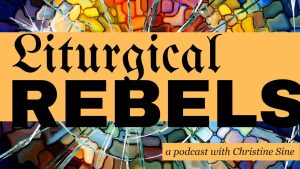 Catch the second episode of Liturgical Rebels!
Catch the second episode of Liturgical Rebels!
As an Amazon Associate, I receive a small amount for purchases made through appropriate links.
Thank you for supporting Godspace in this way.
When referencing or quoting Godspace Light, please be sure to include the Author (Christine Sine unless otherwise noted), the Title of the article or resource, the Source link where appropriate, and ©Godspacelight.com. Thank you!




